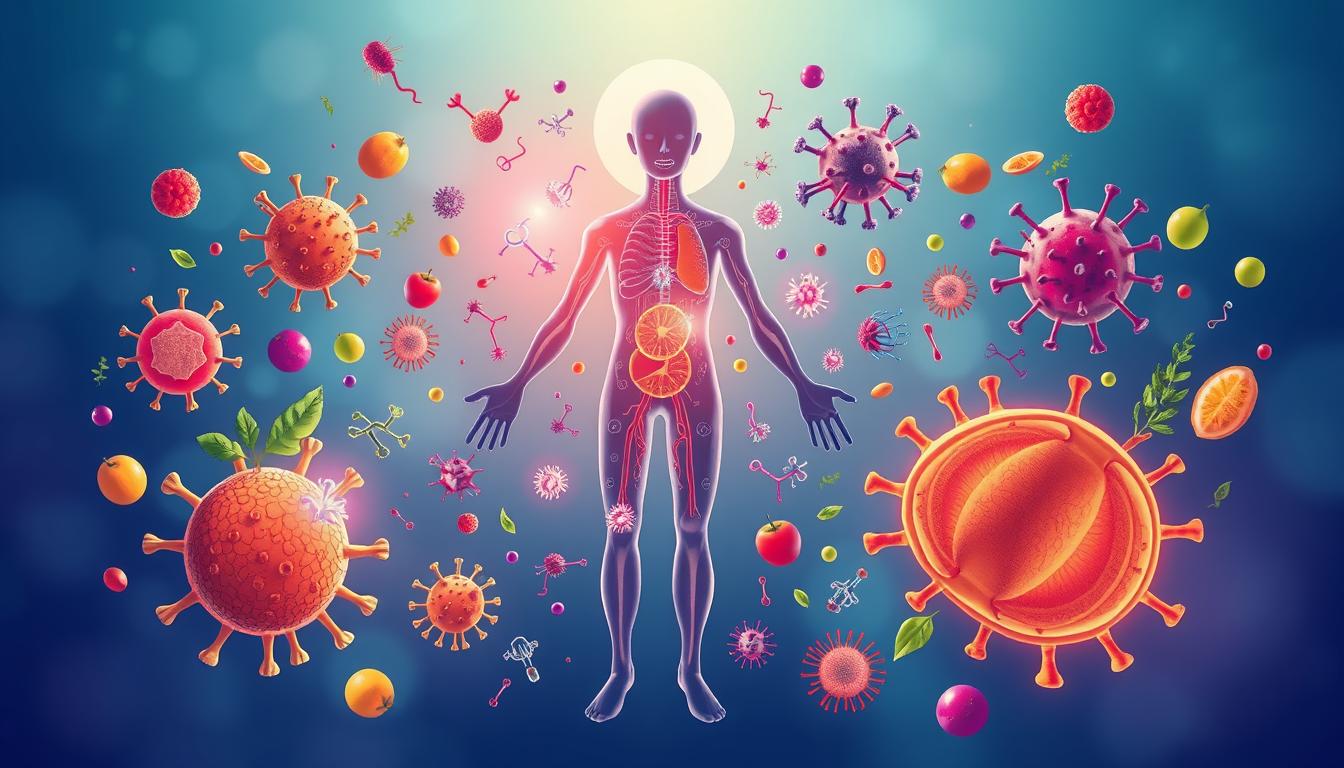In today’s fast world, keeping your immune system strong is key. Your immune system fights off many illnesses, from the common cold to serious diseases. But, can you naturally boost your immunity and stay healthy? Yes, by focusing on your overall well-being.
Want to learn how to naturally boost your immune system? Simple lifestyle changes and adding immune-supporting nutrients to your day can help. This way, your body can fight off infections and stay healthy all year.
Key Takeaways
- A healthy immune system is essential for protecting your body from illness and disease.
- Eating a balanced diet rich in fruits, vegetables, lean proteins, and healthy fats can help strengthen your immunity.
- Regular exercise and adequate sleep are crucial for maintaining a well-functioning immune system.
- Managing stress through relaxation techniques and social connections can also boost your body’s natural defenses.
- Incorporating immune-boosting supplements, like vitamin C and probiotics, can provide an extra layer of protection.
What is the Immune System?
The immune system is a complex network of cells, tissues, and organs. It works together to defend the body against infections and diseases. It protects us from harmful pathogens like bacteria, viruses, and fungi.
The immune system has two main parts: innate immunity and adaptive immunity.
Understanding the Body’s Defense Mechanism
Innate immunity is the body’s first defense. Adaptive immunity develops over time after exposure to specific pathogens. White blood cells and antibodies are key players in fighting off invaders.
The immune system also helps with inflammation. This is important for fighting infections and healing injuries.
Our immune system function is vital for our health and well-being. The immune defense mechanisms protect us from many threats. By understanding our innate immunity and adaptive immunity, we can appreciate our body’s amazing defenses.
“The immune system is a remarkable network of specialized cells, tissues, and organs that have evolved to defend the body against attacks by ‘foreign’ invaders such as bacteria, viruses, and parasites.”
| Key Components of the Immune System | Role in Immune Defense |
|---|---|
| White Blood Cells | Identify and eliminate foreign invaders |
| Antibodies | Neutralize or destroy pathogens |
| Inflammation | Critical process for fighting infections and healing injuries |
The Benefits of a Strong Immune System
A strong immune system brings many benefits that can greatly improve your health. It helps protect you from infections and diseases like the common cold and flu. It also helps fight off serious conditions like cancer.
When your immune system is healthy, you can recover faster from illnesses. This means you’ll have less severe symptoms. Studies show that a strong immune system can make a big difference.
A healthy immune system also helps control inflammation. This is important because inflammation can lead to chronic diseases like heart disease and diabetes. By keeping your immune system strong, you can lower your risk of these diseases.
Having a strong immune system means your body can heal wounds faster. It also means you’ll feel less tired and need less time to rest. This lets you stay active and keep up with your daily activities.
Your immune system affects your skin, hair, and nails too. The cells that help your immune system also keep your skin healthy and promote hair growth. They help your nails stay strong as well.
To keep your immune system healthy, eat well, exercise regularly, get enough sleep, and manage stress. By doing these things, you can enjoy many benefits. You’ll feel better, be more resistant to illness, and recover faster from health problems.
Incorporate Immune-Boosting Foods
Strengthening your immune system is key for good health. Eating foods rich in nutrients can help a lot. Let’s look at two foods that boost your immune system: citrus fruits and leafy greens.
Citrus Fruits: Vitamin C Powerhouses
Citrus fruits like oranges, grapefruits, and lemons are full of vitamin C. Vitamin C is important for your immune system. It helps make white blood cells, which fight infections.
The daily vitamin C need is 75 mg for women and 90 mg for men. These fruits are a great way to get what you need.
Leafy Greens: Nutrient-Dense Superfoods
Leafy greens, such as spinach and kale, are full of vitamins and minerals. They have vitamins A, C, and E, and fiber too. Eating them often can help keep your body strong against sickness.
| Immune-Boosting Nutrient | Excellent Food Sources | Daily Recommended Intake |
|---|---|---|
| Vitamin C | Citrus fruits, bell peppers, broccoli, strawberries | 75-90 mg |
| Vitamin E | Almonds, sunflower seeds, spinach, avocado | 15 mg |
| Zinc | Oysters, crab, beef, chickpeas | 8-11 mg |
| Vitamin D | Salmon, tuna, egg yolks, mushrooms | 600-800 IU |
Eating these foods can help make your body stronger. It’s a good way to support your health.
Maintain a Balanced Diet
Keeping your diet balanced is key to a strong immune system. You need the right mix of macronutrients (like protein, carbs, and fats) and micronutrients (such as vitamins and minerals). This mix helps your body fight off sickness.
Eating a variety of whole foods is best. This includes fruits, vegetables, whole grains, lean proteins, and healthy fats. Stay away from processed and sugary foods. They can harm your health and weaken your immune system.
Studies reveal that 80% of immune cells are in the gut. This shows how important a diet full of fiber, fruits, vegetables, whole grains, and legumes is. A varied diet helps your body fight off infections and inflammation.
Not getting enough essential micronutrients can weaken your immune system. A balanced diet rich in whole, nutrient-dense foods is crucial. It gives your immune system the boost it needs to stay strong.

“No single food or supplement can prevent illness. Focusing on a balanced eating plan, adequate sleep, and stress management can help keep the immune system healthy.”
Stay Physically Active
Keeping up with regular physical activity is key for a strong immune system. Adults who exercise as recommended are less likely to die from flu or pneumonia. This is compared to those who don’t exercise much.
Exercise and Immune Function
Exercise offers both immediate and long-term benefits for your immune system. It boosts the production and power of immune cells like white blood cells and antibodies. These cells are vital in fighting infections.
Being active also reduces inflammation and improves heart health. It helps you sleep better, which strengthens your immune response.
Experts say you should do at least 150 minutes of moderate-intensity aerobic activity each week. You also need two days of muscle-strengthening exercises. Good options for aerobic exercise include brisk walking, cycling, and swimming.
“Moderate-intensity exercise is best for boosting your immunity. Most adults should get at least 150–300 minutes of moderate-intensity aerobic activity or 75 minutes of vigorous physical activity weekly.”
Adding regular physical activity to your routine can make your body stronger. It lowers your chance of getting sick, even in tough times like the COVID-19 pandemic. The most important thing is to find an exercise you like and can keep up with.
Get Adequate Sleep
Getting quality sleep is key for a healthy immune system. Studies show that not enough sleep harms immune function, leading to health problems. Most adults need 7 to 9 hours of sleep each night.
Enough sleep helps the body fight off infections and illnesses. But, not sleeping well can weaken your immune system. Good sleep habits, like a regular schedule and a calm bedtime routine, boost your immune defenses.
In 2016, over a third of Americans didn’t get enough sleep. Research also links less than five hours of sleep a night to higher death rates.
Sleep greatly affects the immune system. Lack of quality sleep or not enough sleep makes you more likely to get sick after being exposed to a virus like the common cold. Sleep deprivation lowers protective proteins and infection-fighting antibodies and cells, weakening the body’s defense against diseases.
To keep your immune system strong, aim for 7 to 8 hours of sleep each night as an adult. Teenagers need 9 to 10 hours, and kids in school need 10 or more hours. A consistent sleep schedule and a calming bedtime routine help you get the sleep you need for good health.
| Sleep Duration Recommendations | Age Group |
|---|---|
| 7-8 hours | Adults |
| 9-10 hours | Teenagers |
| 10+ hours | School-aged children |

Proper sleep helps the immune system respond well to vaccines and less severe allergic reactions. Sleep problems can make allergic reactions worse. Sleep is vital for a strong immune system, helping both innate and adaptive immunity.
“Sleep is essential for the body’s immune system to maintain a delicate balance between being strong enough to fight threats and not being in a constant state of alert or attack.”
Manage Stress Effectively
In today’s fast world, managing stress is key for a healthy immune system. Chronic stress weakens the body’s defenses by lowering immune cell production. It also boosts the hormone cortisol, which hampers the immune response and raises inflammation.
To keep your immune system strong, finding healthy stress management methods is crucial. Techniques like meditation, deep breathing, or yoga can help. Enjoying activities and getting social support also reduce stress, benefiting your health.
Stress and Immune System Responses
Research shows that long-term stress weakens the body’s defenses. High stress hormones can lead to more inflammation, making you more prone to illnesses. But, managing stress well can boost your immune system and improve your health.
- Chronic stress can make sleeping harder, weakening the immune system further.
- Stress increases vulnerability to illnesses, especially viruses and colds.
- Regular meditation lowers cortisol levels, leading to less inflammation.
To fight stress’s harm on your immune system, it’s vital to find healthy ways to cope. Regular exercise, a balanced diet, and enough sleep are key. These steps help manage stress and support your body’s defenses.
| Stress Management Techniques | Benefits |
|---|---|
| Meditation and Deep Breathing | Reduce cortisol levels, lower blood pressure, and improve immune function |
| Regular Exercise | Decrease inflammation, boost mood, and enhance immune system response |
| Social Connections | Provide emotional support, reduce feelings of isolation, and improve overall well-being |
By adding these stress management techniques to your daily life, you can actively support your immune system. This helps maintain your health and well-being.
Immume Boost with Natural Supplements
A balanced diet and a healthy lifestyle are key for a strong immune system. Natural supplements like Vitamin C, Zinc, and Elderberry can offer extra support. They have been studied for their ability to boost immune function and fight off illness.
Vitamin C is a strong antioxidant that can shorten and lessen the severity of colds. The daily dose is usually between 250 and 1,000 mg, with a maximum of 2,000 mg. Zinc is also vital for immune health, and up to 30% of older adults may lack it. Taking zinc supplements can help shorten colds, with a daily dose of under 40 mg.
Elderberry supplements may help with cold symptoms. But, it’s important to cook elderberries before eating them to avoid cyanide poisoning.
Other supplements like Vitamin D, Echinacea, Medicinal Mushrooms (such as Cordyceps and Turkey Tail), and Probiotics can also boost immunity. Always talk to a healthcare provider before starting any new supplements. They can interact with medications or have side effects.
| Supplement | Potential Benefits | Recommended Dosage |
|---|---|---|
| Vitamin C | Reduces duration and severity of respiratory infections | 250-1,000 mg daily, up to 2,000 mg |
| Zinc | Supports immune function, may reduce common cold duration | Under 40 mg of elemental zinc daily |
| Elderberry | May help alleviate upper respiratory symptoms from viral infections | Follow manufacturer’s instructions |
| Vitamin D | Decreases risk of respiratory infections in deficient individuals | 600 IU (15 mcg) daily |
Natural supplements can give your immune system an extra boost. But, they should not replace a healthy lifestyle. Eating well, exercising regularly, and managing stress are still essential for a strong immune system.
Quit Smoking and Limit Alcohol
Keeping your immune system healthy is key to feeling good. Smoking and drinking too much alcohol can hurt it. Stopping smoking and drinking less can really help your body fight off sicknesses.
Smoking can make your immune system weaker, leading to problems like rheumatoid arthritis. Smoking for a long time can make it harder for your body to fight off germs. It can also make some vaccines less effective. Drinking too much alcohol can also harm your immune system, making it harder to fight off illnesses.
- More than 2 million Americans are affected by alcoholic liver disease (ALD).
- Chronic drinkers face many health issues, including infections and inflammation. This is because alcohol affects both parts of the immune system.
- Drinking a lot, even just once, can make it harder to recover from injuries like burns or brain damage.
By stopping smoking and drinking less, you can make your immune system stronger. This can help you avoid getting sick and improve your health.
“Drinking 5-6 drinks in a single session can suppress the immune system for up to 24 hours.”
Having a strong immune system has many benefits. It helps you get better faster and lowers your risk of chronic diseases. Making healthy choices like quitting smoking and drinking less can really help your body’s defenses.
Adopt Healthy Lifestyle Habits
More than just eating right, exercising, and managing stress, other habits can boost your immune system. Drinking enough water, keeping clean, and staying connected with others are key. These habits help your body fight off sickness.
Hydration, Hygiene, and Social Connections
Drinking water is vital for your health. It helps your body work better. Carry a water bottle and drink often to stay hydrated.
Good personal hygiene stops germs and lowers infection risk. Wash your hands well to keep healthy.
Strong social ties and fun activities boost your mental health. This is linked to a strong immune system. Spend time with loved ones, online or in person. These habits help your immune system stay strong.
- Drink plenty of water to stay hydrated
- Practice good personal hygiene, like thorough handwashing
- Nurture your social connections and engage in activities you enjoy
“Maintaining a healthy lifestyle is crucial for supporting your immune system and overall well-being. By focusing on hydration, hygiene, and social connections, you can give your body the tools it needs to thrive.”
Conclusion
Keeping your immune system strong is key to your health. By adding natural, immune-boosting habits to your life, you help your body fight off sickness. Eating well, staying active, sleeping enough, and managing stress are all important.
While supplements can help, a healthy immune system starts with good habits. By focusing on your immune system, you can feel better, recover faster, and avoid chronic diseases.
Using natural remedies and focusing on disease prevention helps you control your health. Adopt these immune-boosting habits and start building a stronger immune system.

